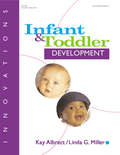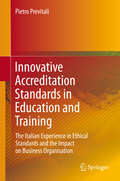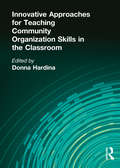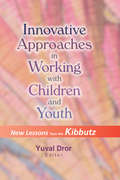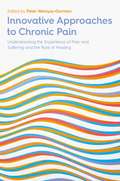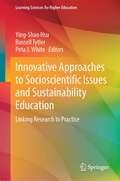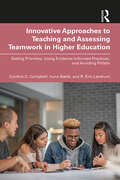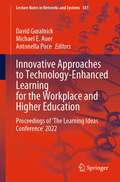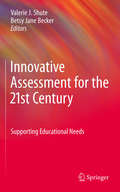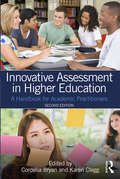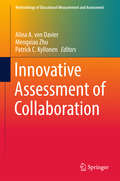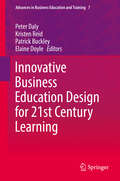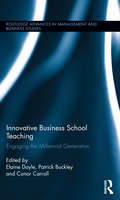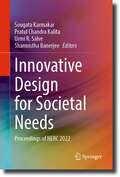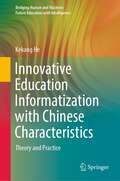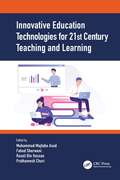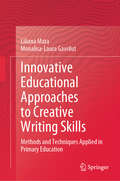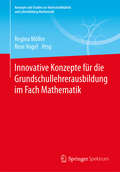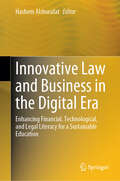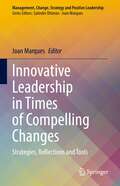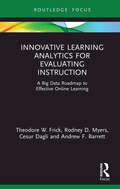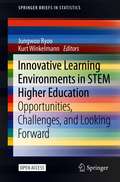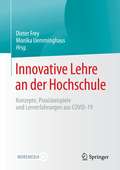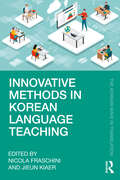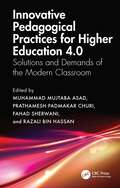- Table View
- List View
Innovations: Infant and Toddler Development
by Linda G. Miller Kay AlbrechtUnderstanding infant and toddler behavior can be a challenge. But this Innovations book provides teacher with a more thorough understanding of the knowledge base that informs early childhood practice. Focusing on the development of children from birth to age three, Innovations gives you an in-depth guide to the early childhood field which begins to address these challenging behaviors in developmentally appropriate ways.
Innovative Accreditation Standards in Education and Training
by Pietro PrevitaliThe aim of this book is to examine how technical and institutional factors affect the responsiveness of public and private organisations to a change in accreditation standards, with specific reference to the vocational educational and training (VET) sector and ethical standards. In particular, the authors analyse the Italian experience regarding a new accreditation standard recently adopted in the Region of Lombardy. Although based on a national experience, this innovative approach to accreditation systems in the educational sector provides a more general framework of analysis of how ethics and compliance can be applied in business organisation worldwide.
Innovative Approaches for Teaching Community Organization Skills in the Classroom
by Donna HardinaBring your students the latest developments in community organization!Innovative Approaches for Teaching Community Organization Skills in the Classroom will help social work educators efficiently teach students methods of practice that they need to know in order to offer the best services to clients with a variety of different needs in a variety of settings. Here you'll find assignments and exercises that combine new technology with progressive ideas about integrating theory and practice. This valuable book consistently addresses topics that will stimulate discussion on the value assumptions inherent in community practice, appropriate ways to transmit these values in the classroom, and the best way to help students develop their own frameworks for ethical decisionmaking.Innovative Approaches for Teaching Community Organization Skills in the Classroom will be a valuable addition to your collection. This accessible and comprehensive book identifies and provides detailed information for teaching these skills in the classroom: ethical decisionmaking community assessment interpersonal skills development making your practice effective in a multi-cultural environment organizing your practice with computer technologyThis book describes teaching methods that will educate your students on the development of self-awareness, multicultural competency, and ethical content for practice, preparing them for the diverse situations that may arise in their professional careers.
Innovative Approaches in Working with Children and Youth: New Lessons from the Kibbutz
by Yuval DrorExplore the unique social and educational laboratory known as the Israeli kibbutz!This valuable book examines state-of-the-art innovations in services for children and youth happening today in the kibbutz in Israel. It brings to light the latest developments in integrated services for clients inside and outside the kibbutz society, services for detached and troubled individuals and groups from outside the kibbutz, and regional services that include kibbutz and non-kibbutz children who live at home while attending kibbutz institutions.According to editor Yuval Dror, ”Since the mid-1980s, the kibbutz movement has experienced a deep social and economic crisis, but despite this negative influence on the semi-private kibbutz educational system, the uniqueness of &’communal/cooperative education&’ has been maintained, and has even grown. The openness of the kibbutz to its neighbors from non-kibbutz settlements in the 1980s and 1990s enabled rural areas to succeed in fruitful cooperation with the kibbutz. These experiences are detailed here.”In Innovative Approaches In Working with Children and Youth: New Lessons from the Kibbutz you&’ll learn about youth aliya groups (youth societies), the Project for the Education of Israeli Children in the Kibbutz Movement, the NA&’ALEH Program, and the Zweig Center for Special Education at Oranim. This unique book brings you: a comparison of two kibbutz secondary boarding schools with residential facilities in different forms a look at a unique way of absorbing young Russian immigrants in kibbutzim and other residential settings an examination of integration practice in kibbutz day schools a discussion of how Kfar Tikva serves disabled adults . . . and much more!Educators and their students, youth workers, and social workers, as well as anyone with an interest in the unique learning opportunities offered by the kibbutz system will find Innovative Approaches In Working with Children and Youth: New Lessons from the Kibbutz an invaluable tool.
Innovative Approaches to Chronic Pain: Understanding the Experience of Pain and Suffering and the Role of Healing
by Tom Shakespeare Paul Dieppe Ann Williamson Havi Carel David Reilly Raanan Gillon Betsan Corkhill Jeremy Swayne Jonathan Koffman Clare Roques John D. Loeser Bryan VernonThis book sets out to restore the concept of healing to its place within and beyond pain medicine, in chapters authored by keynote speakers to the British Pain Society's Philosophy and Ethics Special Interest Group. Exploring psychological, spiritual and creative approaches, contributors reflect on therapeutic avenues ranging from the deliberate use of the placebo response and the importance of a caring relationship between patient and practitioner, to the use of knitting as a therapeutic tool. Barriers to the flow of healing such as practitioners' careless use of language and cultural attitudes are identified and contrasted with the need to understand the first-person perspectives of people who are suffering. This book will provide hope and inspiration both to people who have become disillusioned with conventional medical approaches to the relief of their pain, and to health professionals sadly aware of the frequent inadequacy of their efforts to help them.
Innovative Approaches to Socioscientific Issues and Sustainability Education: Linking Research to Practice (Learning Sciences for Higher Education)
by Russell Tytler Ying-Shao Hsu Peta J. WhiteThis book explores innovative approaches to teacher professional learning, examples of teaching enacted in classrooms, and factors affecting the promotion of quality teaching in socio-scientific issues and sustainability contexts. Since educational settings and cultures influence teaching, the different approaches and perspectives in various cross-national contexts enable us to appreciate the diversity of different countries’ practices and provide insight into seminal approaches to socio-scientific issues-based teaching internationally. The book consists of three parts: innovative professional development programs, innovative teaching approaches, and issues relating to student engagement with socio-scientific issues and sustainability education. The book targets those who can be expected to develop curriculum, enact teaching practices, and facilitate teachers’ professional development in socio-scientific issues and sustainability education.
Innovative Approaches to Teaching and Assessing Teamwork in Higher Education: Setting Priorities, Using Evidence-Informed Practices, and Avoiding Pitfalls
by R. Eric Landrum Cynthia G. Campbell Iryna BabikThis guide will help instructors better understand the skills that underlie effective teamwork, offer strategies for structuring group projects, and provide advice on imparting the knowledge and support that students need to develop highly functional, advanced teamwork skills. Even instructors with a great deal of experience in structuring collaborative learning projects may recognize the gap that exists between their current efforts in providing students with teamwork experiences and effectively training students’ teamwork skills. By drawing on literature from the fields of organizational teamwork and teamwork pedagogy in higher education, the authors identify the processes associated with effective teamwork, relate these processes to teamwork in student teams, and distill and organize strategies for developing students’ teamwork knowledge, skills, and attitudes. Featuring evidence-informed tools, case studies, and best practices, this highly practical text provides everything higher education instructors need to target and advance their students’ teamwork competencies while maximizing the learning benefits of peer collaboration.
Innovative Approaches to Technology-Enhanced Learning for the Workplace and Higher Education: Proceedings of ‘The Learning Ideas Conference’ 2022 (Lecture Notes in Networks and Systems #581)
by Antonella Poce Michael E. Auer David GuralnickNew technologies provide us with new opportunities to create new learning experiences, leveraging research from a variety of disciplines along with imagination and creativity. The Learning Ideas Conference was created to bring researchers, practitioners, and others together to discuss, innovate, and create. The Learning Ideas Conference 2022 was the 15th annual conference and was the first time the conference was held as a hybrid event. The conference took place from June 15 to 17, 2022, both in New York and online, and included two special tracks: The Adaptive Learning via Interactive, Collaborative and Emotional Approaches (ALICE) Special Track and a track on Inclusive Learning. Topics covered in this book include, among others, online learning methodologies, diversity and inclusion in learning, case studies in university and corporate settings, new technologies in learning (such as virtual reality, augmented reality, holograms, and artificial intelligence), adaptive learning, and project-based learning. The papers included in this book are of interest to researchers in pedagogy and learning theory, university faculty members and administrators, learning and development specialists, user experience designers, and others.
Innovative Assessment for the 21st Century
by Betsy Jane Becker Valerie J. ShuteIn today's rapidly changing and information-rich world, students are not acquiring adequate knowledge and skills to prepare them for careers in mathematics, science, and technology with the traditional approach to assessment and instruction. New competencies (e.g., information communication and technology skills) are needed to deal successfully with the deluge of data. In order to accomplish this, new "educationally valuable" skills must be acknowledged and assessed. Toward this end, the skills we value and support for a society producing knowledge workers, not simply service workers, must be identified, together with methods for their measurement. Innovative Assessment for the 21st Century explores the faces of future assessment--and ask hard questions, such as: What would an assessment that captures all of the above attributes look like? Should it be standardized? What is the role of the professional teacher?
Innovative Assessment in Higher Education: A Handbook for Academic Practitioners
by Cordelia Bryan Karen CleggContextualising why assessment is still the single most important factor affecting student learning in higher education, this second edition of Innovative Assessment in Higher Education: A Handbook for Academic Practitioners offers a critical discourse about the value of assessment for learning alongside practical suggestions about how to enhance the student experience of assessment and feedback. With 17 new chapters this edition: contextualises assessment within the current higher education landscape; explores how student, parent and government expectations impact on assessment design; presents case studies on how to develop, incorporate and assess employability skills; reviews how technology and social media can be used to enhance assessment and feedback; provides examples and critical review of the use and development of feedback practices and how to assess professional, creative and performance-based subjects; offers guidance on how to develop assessment that is inclusive and enables all students to advance their potential. Bridging the gap between theory and the practical elements of assessment, Innovative Assessment in Higher Education: A Handbook for Academic Practitioners is an essential resource for busy academics looking to make a tangible difference to their academic practice and their students’ learning. This practical and accessible guide will aid both new and more experienced practitioners looking to learn more about how and why assessment in higher education can make such a difference to student learning.
Innovative Assessment of Collaboration
by Alina A. Davier Mengxiao Zhu Patrick C. KyllonenThis edited volume provides a platform for experts from various fields to introduce and discuss their different perspectives on the topic of teamwork and collaborative problem solving. It brings together researchers in organizational teaming, educational collaboration, tutoring,simulation, and gaming as well as those involved in statistical and psychometric process modelling. This book seeks to channel this expertise towards advances in the measurement and assessment of cognitive and non-cognitive skills of individuals and teams.
Innovative Business Education Design for 21st Century Learning
by Patrick Buckley Peter Daly Kristen Reid Elaine DoyleThis volume explores two aspects of change within higher education: macro factors governing and influencing the institutional environment, and micro issues taking place within the institutions themselves. The first part of the book examines some of the micro issues that influence business and economics pedagogy. It presents reflections and analyses of teaching roles and values, the enhancement of the student learning experience with technology and real world experiences, and what students want and need to learn. The second part of the book looks at the wider institutional environment of change - the shifts in values, new stakeholders, and a change of focus toward developing skills students need to succeed in business. The book highlights the inter-related nature of these changes and shows that both aspects are important in motivating and inspiring students to be able participants in a 21st century global society. Its focus on interdisciplinarity, curriculum structures, and changing stakeholders helps to analyse the roles and models of business and economics education in addressing the needs of today's global environment.
Innovative Business School Teaching: Engaging the Millennial Generation (Routledge Advances in Management and Business Studies #56)
by Patrick Buckley Elaine Doyle Conor CarrollInnovative Business School Teaching showcases the latest pedagogic innovations that actively engage the millennial generation in learning within the business domain. In the context of the contemporary macro issues facing higher education, this book presents the latest teaching practices and tools used in higher education business teaching, clearly illustrating the practical ways in which business teachers can confront current pedagogic challenges. All of the contributors to this edited book have outstanding track records in teaching, having won national and international awards for teaching excellence, as well as publishing widely on pedagogy. Best practice teaching from multiple jurisdictions across a broad spectrum of business schools is represented. Each contributor shares their innovative teaching tools and techniques in a manner that emphasises how these tools can be adapted to other contexts, thus providing readers with an invaluable teaching resource.
Innovative Design for Societal Needs: Proceedings of NERC 2022
by Sougata Karmakar Urmi R. Salve Pratul Chandra Kalita Sharmistha BanerjeeThis book presents select proceedings of North-East Research Conclave (NERC 2022) on innovative design for societal needs. Human Society and culture are a continuously evolving, complex, and intelligent system. The social needs of humans today are exacerbated by extremely unbalanced regional economic development and cultural identity crises across the globe and within states. This edited book presents cutting-edge research on how design innovation can be used to bring sustainable and meaningful social change. It also provides novel directions for future researchers interested in exploring the impact of design innovation and design thinking on human society. The book can be a valuable reference for beginners, researchers, and professionals interested in innovative design and allied fields.
Innovative Education Informatization with Chinese Characteristics: Theory and Practice (Bridging Human and Machine: Future Education with Intelligence)
by Kekang HeThis book contains the research of Innovative Education Informatization conducted by researchers from School of Educational Technology, Beijing Normal University since early 1990s. There are three main parts of the book. The first part is about six pillars supporting the theory of Innovative Education Informatization with Chinese Characteristics. Six theories are: 1) Theory of Creative Thinking, 2) New Constructivism, 3) Theory of In-depth Integration of Information Technology and Subjects Teaching, 4) New Theory of Teaching Design, 5) Theory of Children’s Thinking Development, and 6) Language Sense Theory. The second part pays attention to advocating maker education system with Chinese characteristics. The third part focuses on Chinese-style flipped classroom. The book will have profound impact on education informatization.
Innovative Education Technologies for 21st Century Teaching and Learning
by Muhammad Mujtaba AsadThis book highlights all aspects of innovative 21st-century education technologies and skills which can enhance the teaching and learning process on a broader spectrum, based on best practices around the globe. It offers case studies on real problems involving higher education, it includes policies that need to be adaptable to the new environments such as the role of accreditation, online learning, MOOCs, and mobile-based learning. The book covers all aspects of the digital competencies of teachers to fulfill the required needs of 21st-century classrooms and uses a new pedagogical approach suitable for educational policies. Innovative Education Technologies for 21st Teaching and Learning is the first book that addresses the teaching and learning challenges and how those challenges can be mitigated by technology which educational institutions are facing due to the COVID-19 pandemic. This book is suitable for teachers, students, instructional and course designers, policymakers, and anyone interested in 21st-century education.
Innovative Educational Approaches to Creative Writing Skills: Methods and Techniques Applied in Primary Education
by Liliana Mata Monalisa-Laura GavrilutThis book provides innovative educational approaches to the development of primary school students' creative writing skills and highlights the need to develop creative writing skills in today's schools. It presents the educational model of creative writing skills training, which combines all curriculum components: educational objectives, curricular contents, teaching methods and techniques, and competency-based assessment. This book also explores new perspectives such as creative writing as art, freedom, and exploration, the digitization of creative writing, and promoting reflective learning through creative writing exercises. This book serves as a useful guide for educators to foster creative writing in primary school classrooms, as well as for researchers in the field of language teaching, and other readers who are interested in the topic.
Innovative Konzepte für die Grundschullehrerausbildung im Fach Mathematik (Konzepte und Studien zur Hochschuldidaktik und Lehrerbildung Mathematik)
by Rose Vogel Regina MöllerDer Band stellt innovative Konzepte in der Grundschullehrbildung aus den verschiedenen Bundesländern vor. Anlässe, Innovationen in der Grundschulausbildung vorzustellen und darüber Reflexionen anzuregen, gibt es viele: so zum Beispiel die strukturelle Vielfalt in der Grundschullehrerausbildung in den einzelnen Bundesländern, die unterschiedliche Gewichtung mathematischer und mathematikdidaktischer Kompetenzen im Kontext heterogener Ausbildungsbedingungen und differenzierte Konkretisierungen der Standards für die Lehrerbildung im Fach Mathematik. Im Fokus dieses Bandes stehen hochschuldidaktische Lehrkonzepte im Sinne von good “practice“. Im Einzelnen gilt es darzustellen, auszuloten und zu reflektieren zu welchen Auswirkungen die vorangegangenen Reformen der letzten zwanzig Jahre mit ihrer Neustrukturierung der Lehrerbildung samt gestufter Studienstruktur mit Bachelor- und Masterabschlüssen geführt haben. Neben landespezifischen Akzentsetzungen fokussieren sich diese Bemühungen auf eine stärkere Praxisorientierung während der Ausbildung, auf Intensivierung der Beziehungen zwischen den einzelnen Ausbildungsphasen, auf die besondere Bedeutung der sogenannten Berufseingangsphase und auf Maßnahmen zur Verbesserung der Lehrtätigkeit im Hinblick auf diagnostische und methodische Kompetenzen.
Innovative Law and Business in the Digital Era: Enhancing Financial, Technological, and Legal Literacy for a Sustainable Education
by Hashem AlshurafatThis book offers a comprehensive exploration of the intersection of such critical areas of knowledge as law, business, and technological innovation. As the digital revolution transforms industries, this book provides scholars, professionals, and students with critical insights into how legal frameworks and business strategies can adapt to foster sustainable growth. With a focus on improving financial, technological, and legal literacy, the book explores the challenges and opportunities in the business environment that can lead to a sustainable education for future generations. The book covers a wide range of topics essential to navigating the complexities of today's digital landscape, from regulatory compliance in emerging technologies to sustainable business models and innovation-driven markets. Written by leading experts, this book offers theoretical and practical perspectives on integrating sustainability, innovation, and legal expertise into business practices. This book is essential for readers who want to understand how law and business can work together to shape a future driven by innovation and ethical principles.
Innovative Leadership in Times of Compelling Changes: Strategies, Reflections and Tools (Management, Change, Strategy and Positive Leadership)
by Joan MarquesThis book focuses on the need of leaders in professional and personal realms to understand the importance of innovative thinking to safeguard sustainability and enhance satisfaction and motivation among stakeholders in organizations. It provides professionals with a set of reflective stances, cautionary points, and roadmaps that enable them to do the right thing. From crisis management to spiritual practices, and from pro-social concepts to social responsibility and sustainability: the common denominator is a collective and concerted effort to develop leadership behaviors and strategies to safeguard generations to come.
Innovative Learning Analytics for Evaluating Instruction: A Big Data Roadmap to Effective Online Learning
by Rodney D. Myers Theodore W. Frick Cesur Dagli Andrew F. BarrettInnovative Learning Analytics for Evaluating Instruction covers the application of a forward-thinking research methodology that uses big data to evaluate the effectiveness of online instruction. Analysis of Patterns in Time (APT) is a practical analytic approach that finds meaningful patterns in massive data sets, capturing temporal maps of students’ learning journeys by combining qualitative and quantitative methods. Offering conceptual and research overviews, design principles, historical examples, and more, this book demonstrates how APT can yield strong, easily generalizable empirical evidence through big data; help students succeed in their learning journeys; and document the extraordinary effectiveness of First Principles of Instruction. It is an ideal resource for faculty and professionals in instructional design, learning engineering, online learning, program evaluation, and research methods.
Innovative Learning Environments in STEM Higher Education: Opportunities, Challenges, and Looking Forward (SpringerBriefs in Statistics)
by Kurt Winkelmann Jungwoo RyooAs explored in this open access book, higher education in STEM fields is influenced by many factors, including education research, government and school policies, financial considerations, technology limitations, and acceptance of innovations by faculty and students. In 2018, Drs. Ryoo and Winkelmann explored the opportunities, challenges, and future research initiatives of innovative learning environments (ILEs) in higher education STEM disciplines in their pioneering project: eXploring the Future of Innovative Learning Environments (X-FILEs). Workshop participants evaluated four main ILE categories: personalized and adaptive learning, multimodal learning formats, cross/extended reality (XR), and artificial intelligence (AI) and machine learning (ML). This open access book gathers the perspectives expressed during the X-FILEs workshop and its follow-up activities. It is designed to help inform education policy makers, researchers, developers, and practitioners about the adoption and implementation of ILEs in higher education.
Innovative Lehre an der Hochschule: Konzepte, Praxisbeispiele und Lernerfahrungen aus COVID-19
by Dieter Frey Monika UemminghausDieses Buch vermittelt anschaulich und konkret, wie an der Exzellenzuniversität LMU München im Rahmen des Multiplikatoren-Programms entwickelte innovative Lehrkonzepte von Dozent*innen aller Fachgebiete in der eigenen Lehrtätigkeit umgesetzt werden können. Neben grundlegenden Hinweisen zu lernpsychologisch fundierten Maßnahmen für Führung von Teams, Motivation von Studierenden sowie Wertevermittlung und Begeisterung werden neue Ansätze digitaler Lehre vermittelt. Ergänzend fließen ganz aktuelle Erkenntnisse aus den ersten durch COVID-19 bedingten, rein digitalen Semestern ein und bieten die Chance, aus diesen Erfahrungen für die Lehrformate der Zukunft zu lernen. In einem zweiten Buchteil berichten Lehrende aus unterschiedlichen Fachgebieten von konkreten Innovationsmaßnahmen zur Verbesserung der Lehrqualität und stellen ihre spezifischen Ansätze zur Lösung von universitärer Lehre immanenten Problemlagen vor. Diese kurzen Best-Practice-Berichte, die in ausführlicherer Form im Internet als downloadbare Online-Ressource bereitgestellt werden, geben Anregungen, wie diese Projekte für andere Lehrende diverser Fachgebiete adaptierbar sind.
Innovative Methods in Korean Language Teaching (The Korean Wave in Translation)
by Jieun Kiaer Nicola FraschiniInnovative Methods in Korean Language Teaching showcases research-based and experience-based contributions and reflections on the potential of adopting technological and non-technological innovations to promote Korean language students’ learning.The chapters included in this book consider a wide range of innovative technologies and approaches, such as large language models, virtual reality solutions, metaverse platforms, multimodal teaching, and critical pedagogy, and represent a variety of geographical learning contexts from North America to Europe, from Korea to the broader Asia-Pacific region. Overall, these contributions make the case for embracing new technologies instead of banning them and for accepting pedagogical shifts that take into consideration contemporary understandings of the communication, teaching, and learning processes.This book will be of interest to graduate students, researchers, and practitioners of Korean language education and to those working on language teaching and learning in general, to inform future teaching practices through careful consideration of contemporary technologies and teaching approaches.
Innovative Pedagogical Practices for Higher Education 4.0: Solutions and Demands of the Modern Classroom
by Muhammad Mujtaba Asad Fahad Sherwani Razali Bin Hassan Prathamesh Padmakar ChuriInnovative and creative teaching methods tailored to meet the demands of the current era of Industrial Revolution 4.0 are becoming increasingly prevalent in higher education institutions. Educators must cultivate and implement these strategies in their classrooms to incorporate the essential skills of Education 4.0 and digitalization in education. This book aims to explore and showcase various aspects of innovative pedagogies for Higher Education 4.0, drawing from best practices worldwide to provide a comprehensive understanding of this evolving field.Innovative Pedagogical Practices for Higher Education 4.0 highlights the cutting‑edge technologies essential for Education 4.0 and equips educators with the skills required for 21st‑century teaching. Through international case studies, this book explores the integration of educational technology, illuminating the obstacles encountered by educational institutions aiming to embrace Education 4.0 in higher education settings. Furthermore, it presents inventive tools and strategies for harnessing technology in teaching, offering a new outlook on innovative pedagogies.This book meets the need for solutions that tackle the challenges of Education 4.0 and demonstrates how these challenges can be overcome through innovative pedagogies for student learning in higher education institutions. It is a valuable resource for educators, specialists, academic institutions, and policymakers seeking practical solutions in the ever‑evolving landscape of education.
